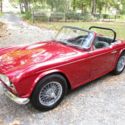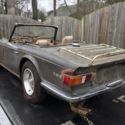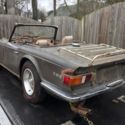1979 Triumph TR-7, Barn find, Convertible 2-Door
| Make: | Triumph |
| Model: | Other |
| Year: | 1979 |
| Mileage: | 87,150 |
| VIN: | TCT112114VCF |
| Color: | burnt orange |
| Engine: | 4 cyl |
| Cylinders: | 4 |
| Fuel: | Gasoline |
| Transmission: | standard |
| Interior color: | burnt orange tartan |
| Drive side: | Left-hand drive |
| Vehicle Title: | Clear |
| Item location: | Isle la Motte, Vermont, United States |
1979 Triumph Other Additional Info:
Stored in a barn in northern Vermont and removed last spring to be detailed and completely gone over mechanically by an excellent Swanton mechanic who is willing to speak to interested parties. Clutch was "frozen in place and freed. Car needs a new battery and has to be picked up or shipped from Swanton Vermont by buyer. Interior fabric is tender and shows some "thin" areas", floor rug on drivers side needs replacing. Mechanic says no rust and mechanically very good with no work needed at this time. Tires are 90% with no weather checking. Auto has not been outside for many years!The Triumph TR7 is a sports car manufactured from September 1974 to October 1981 by the Triumph Motor Company (which was part of British Leyland) in the United Kingdom. It was initially produced at the Speke, Liverpool factory,[2][3][4] moving to Canley, Coventry in 1978 and then finally to the Rover Solihull plant in 1980. The car was launched in the United States in January 1975, with its UK home market debut in May 1976. The UK launch was delayed at least twice because of high demand for the vehicle in the US, with final sales of new TR7s continuing into 1982.
The car was characterised by its "wedge" shape, which was commonly advertised as: "The Shape of Things to Come", and by a swage line sweeping down from the rear wing to just behind the front wheel. The design was penned by Harris Mann who also designed the wedge-shaped Princess. The car had an overall length of 160inches (406cm), width of 66inches (168cm), wheelbase of 85inches (216cm) and height of 49.5inches (126cm). The coupé had a kerbside weight of 2205 pounds (1000kg). During development, the TR7 was referred to by the code name "Bullet". Original full size model wore MG logos because it was styled at Longbridge, which was not a Triumph factory.[citation needed]
Power was provided by a 105bhp (78kW) (92bhp or 69kW in the North American version) 1,998cc eight-valve four-cylinder engine that shared the same basic design as the Triumph Dolomite Sprint engine, mounted in-line at the front of the car. Drive was to the rear wheels via a four-speed gearbox initially with optional five-speed manual gearbox, or three-speed automatic from 1976. The front independent suspension used coil spring and damper struts and lower single link at the front, and at the rear was a four-link system, again with coil springs. There were front and rear anti roll bars, with disc brakes at the front and drums at the rear.




















